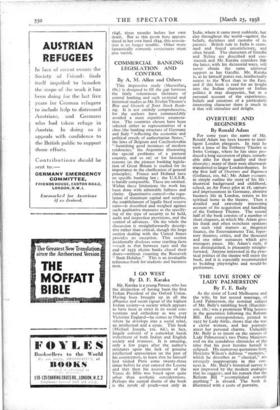COMMERCIAL BANKING - LEGISLATION AND CONTROL By A. M. Allen
and. Others This impressive study (Macmillar, as.) is designed to fill the gap between the fairly voluminous literature of central banking and such sectional and historical studies as Mr. Evelyn Thomas's Rise and Growth of Yoint Stock Bank- ing. It is not entirely comprehensive, for the authors have commendably avoided a mere repetitive enumera- tion. The countries chosen have been selected either as representatives of a class (the banking structure of Germany and Italy "reflecting the economic and political creeds of authoritarian States," the laws of Belgium and Czechoslovakia " furnishing good instances of modern tendencies," the Argentine illustrating the - special problems of a pastoral country, and so on) or for historical reasons (as the pioneer banking legisla- tion of Great Britain is studied for its importance in the clarification of general principles). France and Holland have no specific banking law ; the U.S.S.R. is hardly comparable. These are omitted. Within these limitations the work has been done with admirable fullness and clarity. Quantitative control—the regu- lation of minimum capital and surplus, the establishment of legally fixed reserve ratio—is described and weighed against such qualitative measures as the specify- ing of the type of security to be held, audit and inspection provisions, and the control of advances. On the whole the discussion is straightforwardly descrip- tive rather than critical, though the large section dealing with the United States provides an exception. This section incidentally discloses some startling facts —such as that between 1921 and the end of 1933 16,60o banks closed their doors—without counting the Roosevelt " Bank Holiday." This is an invaluable reference-book for students and business men.










































































 Previous page
Previous page